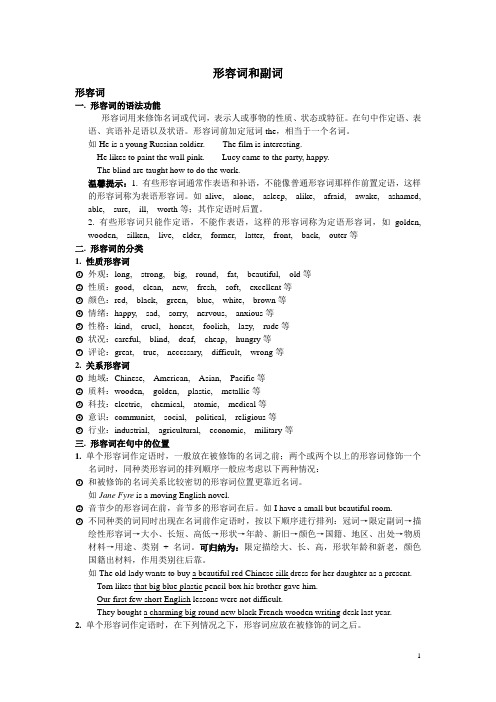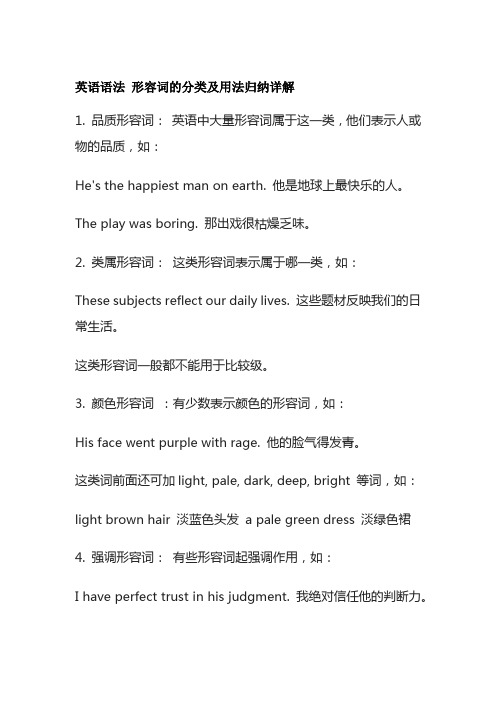形容词的语法功能
形容词的用法

形容词的用法Step 1: 回顾上节课所学的知识并检查家作;Step 2: 形容词和副词的讲解:形容词是用于描写或修饰名词或代词的词。
它在句子中主要用作表语、定语和宾语补足语。
有些形容词通常只用作表语,被称之为表语形容词;有的形容词只用作定语,被称之为定语形容词。
一、形容词的语法功能1. 作定语:Who can lift this heavy case? 谁能举起这个重箱子?The scientist gave us an interesting and helpful report yesterday.2. 作表语:It is fine today.Don't feel sad. Everything will be all right.3. 作宾语补足语:The news made her happy.We found the text very difficult.You should keep your classroom clean.Who left the window open?4. 作状语He went back, full of fear.He spent seven days in the wind and snow, cold and hungry.5. 名词化的形容词可以做主语和宾语1) “the+形容词”表示某一类人,起名词作用,可做主语或宾语。
做主语时,谓语动词用复数形式。
The rich are not always happy.We should take good care of the blind.The wounded have been sent to the hospital.We should respect the old and love the young.2) the +true/good/beautiful/bad/false/ugly等表示抽象概念的词做主语时,谓语动词一般用单数形式。
语法精讲-- 形容词、副词

5. —Let’s go shopping at the new mall.
—Why not shop online? It’s _______.
A. expensive
B. more expensive
C. less expensive expensive
D. the most
【解析】选C。由句意可知答语应为“为什么不网上购物?它 更便宜。”less expensive意为“更便宜”。
A. brave worried
B. proud
C. successful
D.
【解析】选B。brave勇敢的;proud自豪的;successful成 功的;worried忧虑的。由常识可知当刘翔在比赛中又获得第 一名时,我们应该感到自豪。故选B。
3. Why are you staying up so late playing computer games again? Stop being so _______.
, ,
官(观)
代表观点的描述性形容 词
fine好的, beautiful漂亮的, interesting有趣的
行(形)
代表表示大小、长短、 small小的, tall高的, high 高低及形状的形容词 高的, round圆的
口诀
说明
例词
令(龄) 代表年龄、新旧的形 young年轻的, old年老的, new
A. funny
B. silly
C. seriLeabharlann us【解析】选B。前句句意为“你为什么又熬夜这么晚玩电脑游 戏?”可知,下一句应为“别这么愚蠢了。”funny有趣的; silly愚蠢的;serious严肃的。
4. Farmers have become _______ in our hometown in recent years. A. more and more rich B. richer and richer C. more rich and more rich 【解析】选B。“比较级and比较级”意为“越……就越……”, rich的比较级是richer。
高中英语语法系统讲解之四形容词和副词

形容词和副词形容词一. 形容词的语法功能形容词用来修饰名词或代词,表示人或事物的性质、状态或特征。
在句中作定语、表语、宾语补足语以及状语。
形容词前加定冠词the,相当于一个名词。
如He is a young Russian soldier. The film is interesting.He likes to paint the wall pink. Lucy came to the party, happy.The blind are taught how to do the work.温馨提示:1. 有些形容词通常作表语和补语,不能像普通形容词那样作前置定语,这样的形容词称为表语形容词。
如alive, alone, asleep, alike, afraid, awake, ashamed, able, sure, ill, worth等;其作定语时后置。
2. 有些形容词只能作定语,不能作表语,这样的形容词称为定语形容词,如golden,wooden, silken, live, elder, former, latter, front, back, outer等二. 形容词的分类1. 性质形容词○1外观:long, strong, big, round, fat, beautiful, old等○2性质:good, clean, new, fresh, soft, excellent等○3颜色:red, black, green, blue, white, brown等○4情绪:happy, sad, sorry, nervous, anxious等○5性格:kind, cruel, honest, foolish, lazy, rude等○6状况:careful, blind, deaf, cheap, hungry等○7评论:great, true, necessary, difficult, wrong等2. 关系形容词○1地域:Chinese, American, Asian, Pacific等○2质料:wooden, golden, plastic, metallic等○3科技:electric, chemical, atomic, medical等○4意识:communist, social, political, religious等○5行业:industrial, agricultural, economic, military等三. 形容词在句中的位置1.单个形容词作定语时,一般放在被修饰的名词之前;两个或两个以上的形容词修饰一个名词时,同种类形容词的排列顺序一般应考虑以下两种情况:○1和被修饰的名词关系比较密切的形容词位置更靠近名词。
英语语法:形容词的主要句法的功能

英语语法:形容词的主要句法的功能形容词的主要句法功能1. 用作表语Everyone was happy. 每个人都很高兴。
He is interested in watching TV. 他对看电视感兴趣。
2. 用作定语He is an honest student. 他是个诚实的学生。
The young man is her boy friend. 这个小伙子是她的男朋友。
3. 用作宾语补足语He pushed the door open. 他把门推开了。
We found the problem very difficult. 我们发现这个问题很难。
【注】这类句型若变为被动语态,形容词则为主语补足语:The problem was found very difficult.4. 用作状语He arrived home, hungry and tired. 他回到家里,又饿又累。
I went there full of joy. 我兴高采烈地去了那儿。
He sat in the corner, silent. 他坐在角落里,一言不发。
形容词用作状语主要表示原因、结果或伴随等,其逻辑主语必须与句子主语保持一致。
这类结构通常可用从句或并列句来改写:He came over, eager to help. / He came over and (he) was eager to help. 他走过来,急于想帮忙。
【注】以上形容词用作状语的情形,有人也称之为主语补足语,因为它们是补充说明主语的。
另外,还有一类特殊的形容词用作状语:The stove was red hot. 火炉是炽热的。
It’s boiling hot. 它是滚烫的。
His face was bright red. 他的脸是鲜红的。
The weather is freezing [icy, bitter] cold. 天气冷极了。
其中的red, boiling, freezing, icy, bitter 等的实际意义大致相当于very,起增强语气的作用,并且它们用法也很有限,如可说bitter cold(冰冷),bitter wind(寒风)等,习惯上却不说 bitterhot(炽热),bitter busy(极忙)等。
高中英语语法-形容词和副词

(2) too(that, this, as, so, how, however)+形容词 +a/an+名词 I‟ve never seen that big an apple. This is too difficult a question. 副词enough要放在形容词的后面,形容词enough放 在名词前后都可: If I had a long enough holiday I„d visit Europe. There is enough food for everyone to eat. = There is food enough for everyone to eat.
(4) too much与much too: too much表示“太多的”,修饰事物数量; much too表示“太过,过分”,修饰形容词或副词: I am full because I have had too much rice. That coat is much too dear. (5) lonely与alone: lonely是表示心理活动的形容词,“孤独的,寂寞的”,作定语或 表语; alone “独自的,单独的”,指无人陪伴,仅作表语,(作为副词的 alone可作状语): He lives alone but he doesn‟t feel lonely.
形容词和副词
形容词修饰名词,说明事物或人的性质或特征。
形容词
性质形容词
叙述形容词
直接说明事物的性质或特征的形容词是性质形容词,它 有级的变化,可以用程度副词修饰,在句中可作定语、 表语和补语。例如:hot。 Today is very hot. It‟s a hot day. 叙述形容词只能作表语,所以又称为表语形容词。这类 形容词没有级的变化,也不可用程度副词修饰。大多数 以a开头的形容词都属于这一类。如,afraid 错: He is an ill man. 对:The man is ill. 错: She is an afraid girl. 对:The girl is afraid. 这类词还有: well,unwell,ill,faisleep,awake
高中英语语法-形容词和副词

quick、fast与soon: quick往往指反应速度快, fast往往指运动速度快, soon则表示时间上很快即将发生: After a quick breakfast, he hurried to school. A train is much faster than a bus. His father will be back to China very soon.
Tony is going camping with ______ boys. A. little two other B. two little other C. two other little D. little other two
答案:C. 由\“限定词--数词--描绘
One day they crossed the ____bridge behind the palace. A. old Chinese stone B. Chinese old stone C. old stone Chinese D. Chinese stone old 答案A. 年龄+国家+材料。
(3) tall与high: Tall 指身高的高度,用于人和动物, 反义词为 short He is very short/tall. High 指物体的高度,另可形容价格,质量等, 反义词为low The kite is flying very high. Tall和high都可用来指tree, building, tower等, 但mountain只能用high形容。
1.Chinese, glass, a, beautiful, table a beautiful Chinese glass table 2.wonderful, my, garden, new, large my wonderful large new garden 3. a, round, table, small a small round table 4. a, old, dirty, brown shirt a dirty old brown shirt
英语语法 形容词的分类及用法归纳详解

英语语法形容词的分类及用法归纳详解1. 品质形容词:英语中大量形容词属于这一类,他们表示人或物的品质,如:He's the happiest man on earth. 他是地球上最快乐的人。
The play was boring. 那出戏很枯燥乏味。
2. 类属形容词:这类形容词表示属于哪一类,如:These subjects reflect our daily lives. 这些题材反映我们的日常生活。
这类形容词一般都不能用于比较级。
3. 颜色形容词:有少数表示颜色的形容词,如:His face went purple with rage. 他的脸气得发青。
这类词前面还可加light, pale, dark, deep, bright 等词,如:light brown hair 淡蓝色头发a pale green dress 淡绿色裙4. 强调形容词:有些形容词起强调作用,如:I have perfect trust in his judgment. 我绝对信任他的判断力。
5. -ing 形容词1)有大量现在分词正在或已经变为形容词,如:It was a tiring journey. 这真是一趟累人的旅行。
2)一些-ing形容词并不与动词有关,如:a cunning trick 狡猾的计谋6. –ed形容词1)大多数-ed形容词都与及物动词有关,是由它们的过去分词变过来的,一般有被动意义,多数为品质形容词,如:I felt depressed. 我感到很沮丧。
2)有些-ed形容词可说是类属形容词,也由动词的过去分词变来,但不能用于比较级,如:。
She is a trained nurse. 她是一个受过训练的护士。
3)有少数-ed形容词,不是由动词,而是由名词变来的:skilled workers 技术工人4)有些-ed 的形容词包含有副词:a well-equipped army 一支装备精良的部队a well-known musician 著名的音乐家7. 合成形容词1)形容词在英语中是比较普遍的,最常见的有:a. 形容词+名词+ed: good-natured 天性善良的b. 形容词+现在分词:easy-going 好说话的c. 名词+现在分词:heart-breaking 令人心碎的2)还有一些其他类型的合成形容词,如:a two-piece suit 两件套的西服all-out attempt 全力以赴的努力3)还有一些三个或更多词构成的合成形容词,如:heart-to-heart talk 推心置腹的谈话An out-of-date driving license 过期驾照一. 形容词的定义和用法:形容词用来修饰名词或代词, 表示人或事物的性质, 状态,和特征。
高中英语 高中简明语法系列---形容词副词分类与功能讲义

形容词形容词(Adjective)用来修饰名词或代词,描绘人和事物的特征。
形容词在句中一般用作定语、主语补语或宾语补语。
补语性形容词和定语性形容词根据形容词的句法功能,形容词可以分为补语性形容词和定语性形容词。
多数形容词既可以作名词的修饰语又可以作主语的补语。
1.只能作补语的形容词(1)以a-开头的形容词,如alone 单独,asleep 熟睡的,awake醒着的,alive活着的,alike 同样的,afraid 害怕,ashamed羞愧看下例:He is fast asleep in his bedroom.他在卧室熟睡。
We are fully aware of the difficulty.我们充分认识到困难。
I felt ashamed of my terrible mistake.我为自己的严重错误感到羞愧。
Paul was again absent from the meeting.鲍尔开会再次缺席。
(2)表示健康状况的形容词well 健康,ill 患病,faint 虚弱。
例如:I didn't feel well, but the doctor said it was nothing serious.我感觉不舒服,可医生说没什么要紧。
His strength grew faint as he was getting on in years.他上了年纪,体力虚弱。
(3)某些表示情感和心理状态的形容词。
例如:I'm glad of your great success in your study.我为你学习上的巨大成功感到高兴。
Shella was sorry about what she had done.希拉对自己的行为感到后悔。
My grandfather is fond of cycling.我祖父喜欢骑自行车。
He is content with his present job and position.他满足于自己的工作和地位。
- 1、下载文档前请自行甄别文档内容的完整性,平台不提供额外的编辑、内容补充、找答案等附加服务。
- 2、"仅部分预览"的文档,不可在线预览部分如存在完整性等问题,可反馈申请退款(可完整预览的文档不适用该条件!)。
- 3、如文档侵犯您的权益,请联系客服反馈,我们会尽快为您处理(人工客服工作时间:9:00-18:30)。
形容词的语法功能
一、形容词的一般用法
1.作定语,一般放在所修饰词的前面。
例如:It’s a cold and windy day.
2.作表语,放在系动词(be,feel,look,smell,get,become等)的后面。
例如:He looks happy today.
3.形容词修饰something,anything,nothing,everything等复合不定代词时,须放在其后。
例如:I have something important to tell you..
4.表示长、宽、高、深及年龄的形容词,应放在相应的名词之后。
(构成:数词+单位词+形容词)
例如:How long is the river?It’s about two hundred metres long.
5.else 只能做后置定语,修饰疑问代词what,who,whom,whose等。
以及不定代词
something,anything,nothing,somebody,anybody,nobody等。
例如:What else would you like ?
6.只能作定语的形容词:little小的;only唯一的;wooden木质的;woolen羊毛质的;elder 年长的;复合形容词kind-hearted善良的,man-made人造的,take-away可带走的等。
(常见的复合形容词:snow-white雪白的English-speaking说英语的;glass-topped玻璃罩的;full-time全日制的;well-known众所周知的;kind-hearted善良的;man-made人造的;take-away可以带走的;ten-year-old十岁的)
例如:My elder brother is in Beijing.
My father is a kind-hearted man.
7.只能作表语的形容词:afraid害怕;alone独自的;asleep睡着的;awake醒着的;alive活着的;well健康的;ill病的;frightened害怕的
例如:He is awake.
8..貌似副词的形容词:lonely独自的;friendly友好的;lively生动的;lovely可爱的。
9.作宾语补足语
形容词作宾语补足语时,常与make,leave,keep等动词连用。
例如:You should make your mother happy.
10.-ed分词作形容词在句中通常修饰人,-ing分词作形容词在句中通常修饰事、物。
例如:He is excited abut the pictures that are exciting.
二、多个形容词修饰名词时,其顺序为:
限定词(冠词、指示代词、形容词性物主代词、数词)——描绘词——表长短、大小、高低的形容词——表形状的形容词——表年龄、新旧的形容词——表颜色的形容词——表国籍、地区、出处的形容词——表物质、材料的形容词——表类别的形容词——名词中心词。
记忆口诀:
美小圆旧黄,中国木书房
房是被修饰的中心名词,书是说明房的作用要靠,也就是放在最近的地方,然后就是材料,然后就是国籍,依次类推下去!
A small round table一张小圆桌
A tall white building一幢高大的白色建筑物
A dirty old black shirt一件又脏又旧的黑色衬衣
A famous American medical school一个非常著名的美国医学院
三、形容词常用句型
1.“It’s +adj.+of+sb.+不定式”表示“某人(做某事)怎么样”。
注意:这一句型中常用描述行为者的性格、品质的形容词,如good(好的),kind(友善的),nice(友好的),polite(有礼貌的),clever(聪明的),foolish(愚蠢的),lazy(懒惰的),careful(细心的),careless(粗心的),right(正确的),wrong(错误的)等。
例如:It’s very kind of you to help me.(=You are very kind to help me.)
你能帮助我,真好。
It’s foolish of him to go alone.(=He is foolish to go alone.)
他单独出去太傻了。
2.“It’s+adj.+for+sb.+不定式”表示“做某事对某人来说怎么样”。
注意:这一句型中常用的形容词有important(重要的),necessary(必要的),difficult(困难的),easy(容易的),hard(艰难的),dangerous(危险的),safe(安全的),useful(有益的),pleasant(舒适的),interesting(有趣的),impossible(不可能的)等。
例如:It’s not easy for them to learn a foreign language.
=To learn a foreign language is not easy for them.
对于他们来说学好一门外语不容易。
It’s very important for students to listen to teachers carefully.
=To listen to teachers carefully is very important for students.
对于学生来说上课认真听老师讲课是非常重要的。
It’s necessary for us to get to school on time.
=To get to school on time is necessary for us.
对于我们来说按时到校是非常必要的。
3.表示感情或情绪的形容词,如glad(高兴的),pleased(高兴的),sad(忧伤的),thankful(感激的)等常接不定式。
例如:Glad to see you.
见到你非常高兴。
I’m very sad to hear the bad news.
听到这个坏新闻,我非常难过。
4.表示能力和意志的形容词,如ready(乐意的,有准备的),able(有能力的),sure(一定),cer tain(一定)等常接不定式。
例如:Lei Feng is always ready to help others.
雷锋总是乐于助人。
He is sure to get to school on time.
他一定会按时到校。
